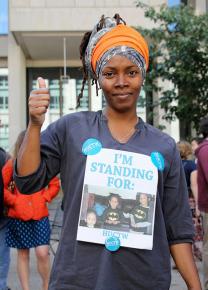We can’t eat prestige
A Harvard clerical worker reports on contract negotiations with the university.
SEVERAL HUNDRED members of the Harvard Union of Clerical and Technical Workers (HUCTW) held a mass "stand out" September 27, in what was the first public action organized by the union in its increasingly contentious contract negotiations with the university.
An official union head count puts the number of members who participated at closer to a thousand if actions at Harvard's satellite campuses around the city of Boston are included. The 4,600 members of HUCTW--who work in a wide range of capacities across the university system--have been without a contract since June 30. The main issues at stake are health care costs and wages.
The "stand out," which the union advertised in an e-mail to members as an action where there would be "No marching, no chanting, no speeches--just hundreds of union members and supporters standing together," marked the first public action that the union leadership has called upon members to come out to in at least 20 years.
For all of its shortcomings, the "stand out" represented the first semi-confrontational labor action that many Harvard workers have participated in. Workers who participated were pleasantly surprised by the numbers who turned out. It was truly great for all of us to see that so many of our co-workers felt passionately about the need to fight for a fair contract.

Frustration among HUCTW members has been on the rise over the past few months, as negotiations have been getting nowhere with Harvard management. Historically, the union has negotiated new contracts fairly quickly and without much, if any, lapse between contracts. Things have clearly changed. HUCTW leadership says this is because Harvard is no longer willing to compromise in good faith as it has in the past.
The recently expired contract, which was negotiated in 2010, was the first unqualified concessionary contract the union agreed to in recent memory. Using the economic recession and financial crisis as justification, Harvard demanded, and received from the union, a virtual freeze on wage increases--which, given an inflation rate in Boston of around 3 percent, amounted to an actual pay cut. That contract was grudgingly accepted by HUCTW members.
By 2012, all indicators point to a more-or-less complete recovery for Harvard. The university's endowment has bounced back to approximately $30 billion; it has at least five construction and renovation projects currently under way across the campus, with a total price tag of close to $2 billion over the next several years; and top Harvard executives continue to receive handsome compensation packages.
The Harvard President Drew Faust takes in just short of $1 million a year. The five most highly compensated managers of Harvard's endowment investments are paid an average of $3 million each. And on top of all that, Harvard, as a registered non-profit institution, pays exactly zero dollars in taxes on the wealth it controls.
This is a slap in the face to Harvard workers who were told that the university simply cannot afford to grant us raises, or that it has no choice but to increase our health care costs.
The health care question also concerns thousands of Harvard retirees, who as a matter of past practice have been represented by the union in negotiations, but who now face increases in health care and prescription drug costs unilaterally imposed by Harvard.
Many of these retirees live on a fixed income of about $30,000, so every increase in health care and other costs makes a big difference in living standards.
FOR NOW, Harvard remains obstinate in its demands for more concessions. One obvious lesson is that when workers make sacrifices to their employers in "lean years," there's absolutely no guarantee that workers can expect anything different once the employers' finances "recover." Just as a shark is only thrown into a further frenzy after tasting blood, so too do concessions only raise the confidence of employers to demand more.
Another important fact is crystal clear. Harvard is pushing to take as much as they can from HUCTW members this time around. Harvard has every reason to prolong negotiations for as long as possible and no particular reason to settle. It's the union that has something to prove here. Will it be able to stand up against Harvard's arrogant greed, or it will crumble under the pressure?
Winning a good contract will clearly require the mobilization of the entire union membership in a series of escalating actions. The union must learn quickly how to change its approach from that of conciliation to that of some degree of mass confrontation.
HUCTW members also can play an important role in continuing to let both Harvard executives and our union leaders know that we're willing and ready to fight for a fair contract, and we refuse concessions as unnecessary and unacceptable. We sacrificed last contract. This time should, literally, be payback.
Finally, we should take instruction from the Harvard janitors who won a good contract last November after enduring months of foot-dragging by Harvard executives on the questions of pay, staffing and health care.
The tipping point in that struggle was a series of marches around campus, including hundreds of janitors joined by hundreds of students, many of whom were involved in the then-ascendant Occupy Harvard. Additionally, the janitors--members of the Service Employees International Union--had overwhelmingly voted to authorize a strike the week before their previous contract was set to expire.
Harvard workers should feel confident about fighting back against a "non-profit" university acting in every way like a tight-fisted, "for-profit" corporation.


